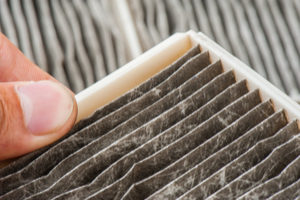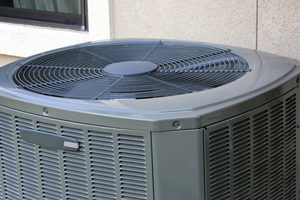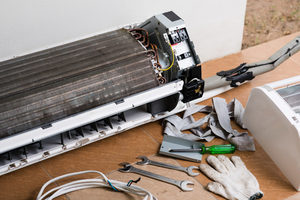 Having HVAC problems is never exactly “fun”, but having them during summer time can be a nightmare. Losing your air conditioning during the hottest days of summer isn’t just extremely uncomfortable, it can actually be dangerous.
Having HVAC problems is never exactly “fun”, but having them during summer time can be a nightmare. Losing your air conditioning during the hottest days of summer isn’t just extremely uncomfortable, it can actually be dangerous.
Luckily, most air conditioning problems can be prevented with a little bit of maintenance and knowhow. Understanding how and why your AC might break down will help you make sure it doesn’t. Look for and fix these four common causes of AC trouble, and you’ll be able to stay cool all summer.
Dirty Filter
 Cleaning an air conditioner’s filter is probably the single most important way you can keep it running. Your air conditioner works by cooling air and then cycling it back into your home. As that air enters your home, it passes through the AC filter. Air contaminants like dirt and bacteria catch in the filter and don’t pass into your home with the air. Over time, all those contaminants build up on the filter, making it dirty.
Cleaning an air conditioner’s filter is probably the single most important way you can keep it running. Your air conditioner works by cooling air and then cycling it back into your home. As that air enters your home, it passes through the AC filter. Air contaminants like dirt and bacteria catch in the filter and don’t pass into your home with the air. Over time, all those contaminants build up on the filter, making it dirty.
Not only do dirty air filters compromise air quality, they hurt your AC unit, too. When the air filter gets dirty, it clogs air flow through the AC unit. The cold air sits inside the unit longer and lowers its internal temperature. Eventually, it could even cause ice to build up on the unit’s coils. When less air travels indoors, the unit also has to work harder, so it wears out faster. We recommend changing your AC unit’s air filter once a month, especially during summer time.
Leaking Refrigerant
 When a liquid evaporates into a gaseous form, it naturally absorbs nearby heat. AC units make use of this phenomenon to cool air by repeatedly cycling refrigerant between liquid and gaseous forms. When the AC turns on, it sucks hot air into the unit. Meanwhile, the refrigerant passes over the evaporator coils and converts into a gas. While it undergoes phase conversion, the refrigerant absorbs the heat in the air that just came into the unit. The air becomes cool, and then the AC unit cycles it back into your home.
When a liquid evaporates into a gaseous form, it naturally absorbs nearby heat. AC units make use of this phenomenon to cool air by repeatedly cycling refrigerant between liquid and gaseous forms. When the AC turns on, it sucks hot air into the unit. Meanwhile, the refrigerant passes over the evaporator coils and converts into a gas. While it undergoes phase conversion, the refrigerant absorbs the heat in the air that just came into the unit. The air becomes cool, and then the AC unit cycles it back into your home.
Simply put: without refrigerant, your AC can’t function correctly. Remember: any loss of refrigerant is not normal. Refrigerant isn’t “used up” by the phase conversion process; it’s repeatedly recycled from liquid to gas. If your AC unit is running out of refrigerant, it’s probably because the outside system is leaking. Leaking refrigerant can cause all kinds of AC problems and could inflict enough damage to break the whole system.
Sensor Malfunction
 HVAC systems use a thermostat sensor to measure the temperature of the air coming into it. This sensor is usually located near the evaporator coils inside the outer unit. When the unit sucks air through the system, the air rushes past the sensor. At that moment, the sensor reads the air temperature and compares it to the temperature you selected on your thermostat. If the air isn’t the right temperature, the sensor tells the unit to either heat or cool it.
HVAC systems use a thermostat sensor to measure the temperature of the air coming into it. This sensor is usually located near the evaporator coils inside the outer unit. When the unit sucks air through the system, the air rushes past the sensor. At that moment, the sensor reads the air temperature and compares it to the temperature you selected on your thermostat. If the air isn’t the right temperature, the sensor tells the unit to either heat or cool it.
If the sensor in your AC unit starts malfunctioning, several things could happen. If your sensor breaks, your AC could simply stop running altogether. If it’s faulty but not totally broken, it could misinterpret the temperature of the air passing through the system. It might tell your AC to run longer than it should or activate it more frequently than it should. Sensor malfunctions can stress the AC system, lowering its life span and leading to a break down.
Drainage Problems
 When your AC unit rapidly cools warm air, water molecules inside the air condense and form moisture. As a result, condensation builds inside the AC unit, especially on the evaporator coils where the cooling happens. This moisture drips off of the coils and onto a tray located beneath them. This tray funnels the condensate water into a drain line, where it’s safely transferred to a household sewer line.
When your AC unit rapidly cools warm air, water molecules inside the air condense and form moisture. As a result, condensation builds inside the AC unit, especially on the evaporator coils where the cooling happens. This moisture drips off of the coils and onto a tray located beneath them. This tray funnels the condensate water into a drain line, where it’s safely transferred to a household sewer line.
Drainage problems happen when something goes wrong at any step in this process. If the tray beneath the evaporator coil cracks or moves, condensate won’t end up where it should. If something blocks the drain line, condensate could overflow out of it into the system. When condensate builds up in the AC system, mold or algae could develop inside it. The moisture could also leach into the air processed in the unit, causing humidity problems in your home.
Understanding and preventing these four air conditioning problems will maximize the health and longevity of your AC. They will not, unfortunately, guarantee that your AC makes it through the season without incident.
Even if that happens, don’t panic! Just call Mike Diamond any time. Our professional technicians have everything they need to fix your air conditioning problem quickly and effectively. We’ll make your home habitable again in no time.


